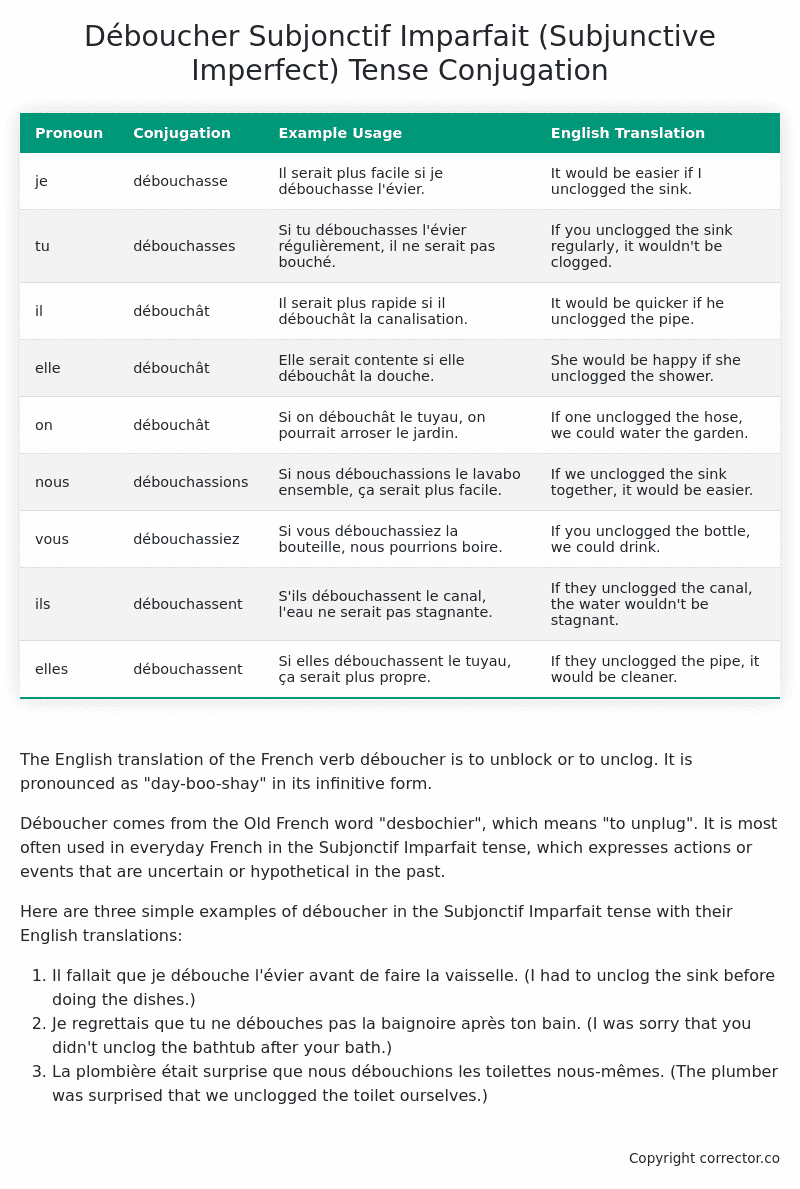Subjonctif Imparfait (Subjunctive Imperfect) Tense Conjugation of the French Verb déboucher
Introduction to the verb déboucher
The English translation of the French verb déboucher is to unblock or to unclog. It is pronounced as “day-boo-shay” in its infinitive form.
Déboucher comes from the Old French word “desbochier”, which means “to unplug”. It is most often used in everyday French in the Subjonctif Imparfait tense, which expresses actions or events that are uncertain or hypothetical in the past.
Here are three simple examples of déboucher in the Subjonctif Imparfait tense with their English translations:
- Il fallait que je débouche l’évier avant de faire la vaisselle. (I had to unclog the sink before doing the dishes.)
- Je regrettais que tu ne débouches pas la baignoire après ton bain. (I was sorry that you didn’t unclog the bathtub after your bath.)
- La plombière était surprise que nous débouchions les toilettes nous-mêmes. (The plumber was surprised that we unclogged the toilet ourselves.)
Table of the Subjonctif Imparfait (Subjunctive Imperfect) Tense Conjugation of déboucher
| Pronoun | Conjugation | Example Usage | English Translation |
|---|---|---|---|
| je | débouchasse | Il serait plus facile si je débouchasse l’évier. | It would be easier if I unclogged the sink. |
| tu | débouchasses | Si tu débouchasses l’évier régulièrement, il ne serait pas bouché. | If you unclogged the sink regularly, it wouldn’t be clogged. |
| il | débouchât | Il serait plus rapide si il débouchât la canalisation. | It would be quicker if he unclogged the pipe. |
| elle | débouchât | Elle serait contente si elle débouchât la douche. | She would be happy if she unclogged the shower. |
| on | débouchât | Si on débouchât le tuyau, on pourrait arroser le jardin. | If one unclogged the hose, we could water the garden. |
| nous | débouchassions | Si nous débouchassions le lavabo ensemble, ça serait plus facile. | If we unclogged the sink together, it would be easier. |
| vous | débouchassiez | Si vous débouchassiez la bouteille, nous pourrions boire. | If you unclogged the bottle, we could drink. |
| ils | débouchassent | S’ils débouchassent le canal, l’eau ne serait pas stagnante. | If they unclogged the canal, the water wouldn’t be stagnant. |
| elles | débouchassent | Si elles débouchassent le tuyau, ça serait plus propre. | If they unclogged the pipe, it would be cleaner. |
Other Conjugations for Déboucher.
Le Present (Present Tense) Conjugation of the French Verb déboucher
Imparfait (Imperfect) Tense Conjugation of the French Verb déboucher
Passé Simple (Simple Past) Tense Conjugation of the French Verb déboucher
Passé Composé (Present Perfect) Tense Conjugation of the French Verb déboucher
Futur Simple (Simple Future) Tense Conjugation of the French Verb déboucher
Futur Proche (Near Future) Tense Conjugation of the French Verb déboucher
Plus-que-parfait (Pluperfect) Tense Conjugation of the French Verb déboucher
Passé Antérieur (Past Anterior) Tense Conjugation of the French Verb déboucher
Futur Antérieur (Future Anterior) Tense Conjugation of the French Verb déboucher
Subjonctif Présent (Subjunctive Present) Tense Conjugation of the French Verb déboucher
Subjonctif Passé (Subjunctive Past) Tense Conjugation of the French Verb déboucher
Subjonctif Imparfait (Subjunctive Imperfect) Tense Conjugation of the French Verb déboucher (this article)
Subjonctif Plus-que-parfait (Subjunctive Pluperfect) Tense Conjugation of the French Verb déboucher
Conditionnel Présent (Conditional Present) Tense Conjugation of the French Verb déboucher
Conditionnel Passé (Conditional Past) Tense Conjugation of the French Verb déboucher
L’impératif Présent (Imperative Present) Tense Conjugation of the French Verb déboucher
L’infinitif Présent (Infinitive Present) Tense Conjugation of the French Verb déboucher
Struggling with French verbs or the language in general? Why not use our free French Grammar Checker – no registration required!
Get a FREE Download Study Sheet of this Conjugation 🔥
Simply right click the image below, click “save image” and get your free reference for the déboucher Subjonctif Imparfait tense conjugation!

Déboucher – About the French Subjonctif Imparfait (Subjunctive Imperfect) Tense
Formation
Common Everyday Usage Patterns
Interactions with Other Tenses
Subjonctif Présent
Indicatif Passé Composé
Conditional
Conditional Perfect
Summary
I hope you enjoyed this article on the verb déboucher. Still in a learning mood? Check out another TOTALLY random French verb conjugation!


